
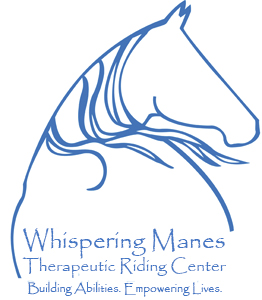
Whispering Manes Therapeutic Riding Center
6105 SW 125th Avenue
MIAMI, FL 33183
Mailing Address:
6105 SW 125th Avenue
MIAMI, FL 33183
Phone: 305-596-4204
MAKE AN INQUIRY
View our WEBSITE
EIN: 27-3697303Founded: 2010
View our PHOTO GALLERY
Profile Last Updated December 29, 2025Public Charity
Click here to view listing(s) of the program horses we are seeking

The Guardian Seal of Transparency is awarded annually to recognize an organization's commitment to transparency and accountability by their willingness to make comprehensive data about their programs, horse care practices, and governance available for public scrutiny. The Guardian Seal of Transparency is NOT an endorsement.
Last Updated: July 21, 2025
Whispering Manes Therapeutic Riding Center has not attained the Guardian designation for 2026.

MISSION & PROGRAMS
Mission:To benefit children and adults with special needs or disabilities by offering them the opportunity to interact with dedicated horses in a manner that promotes physical, mental, and emotional wellbeing. We believe people can develop therapeutic relationships with horses in a way that encourages healing and improved self-esteem.
Our organization conducts Equine Assisted Services in accordance with the EQUUS Foundation Guidelines on Qualifications of Organizations Conducting Equine Assisted Services (EAS).
Our organization provides outreach and/or public education programs involving horses.
100% of our total programs and services are equine-related.
Our organization is directly responsible for the care and shelter of equines involved in our programs.
Our organization does not CURRENTLY use satellite, overflow, foster, and/or outreach facilities.
Please describe what steps your organization takes to ensure that:
1) all interactions between your equines and people are mutually beneficial and conducted in accordance with the Guidelines for Human-Equine Interactions stated below;
2) all equines in the care of our organization and/or equines that participate in the organization's program have access to clean drinking water at all times; nutritious food in sufficient quantity, including natural forage such as pasture grass and/or hay; appropriate veterinary, farrier, and dental care; shelter and protection from the weather; sufficient safe space to move around comfortably on a daily basis; and daily opportunity to freely interact and have contact with other equines:
1. We offer a variety of programs that foster meaningful connections between individuals and the equines in our care. At the heart of our philosophy is the belief that horses are sentient beings, and we strive to ensure that they benefit from every interaction just as much as the participants do.
Everyone who engages with our horses—whether as a participant or a volunteer—is encouraged to learn and contribute to their care, based on their individual abilities. For some, this may mean simply brushing a few strokes, while others may take on more involved tasks such as tacking up, feeding, or stall cleaning.
To safeguard the well-being of our herd, each horse’s work schedule is carefully monitored. No horse works more than 10 hours per week. As our programs expand, we plan to grow our herd accordingly to maintain this healthy balance.
Here are two examples of the interactions between horses and individuals who participate in our equine-assisted programs
. Empowering Independence Through Riding
One rider, a teenager with autism and limited verbal communication, began lessons at Whispering Manes with significant anxiety and difficulty with focus. Over time, and with the consistent support of trained volunteers and instructors, he built a trusting relationship with his horse and gained confidence with each session. His parents reported improved communication at home, increased willingness to try new things, and greater self-regulation—transformations they attribute to his experiences in our program.
2. Building Community Through Volunteer Engagement
In 2024, we introduced a new structured Volunteer-in-Training program designed to make our volunteer opportunities more inclusive. Through a meaningful partnership with Best Buddies, we welcomed individuals with disabilities into our volunteer community. This initiative provided more people with the chance to learn about horse care and gain a deeper understanding of the unique needs of our herd. This also helped us to increase the number of trained volunteers, thus providing an even better experience for both horse and human. One teenage participant, diagnosed with a developmental disability, expressed a strong desire to give back. Through the program, he received training tailored to his abilities and now assists with grooming horses and preparing tack. He proudly wears his volunteer t-shirt and name tag and his parents have shared that this opportunity has boosted his self-esteem and given him a sense of responsibility.
2. Each horse in our herd has access to both a stall and a paddock. Most of the time, our horses are kept outdoors in spacious paddocks equipped with shelters and automatic water bowls, allowing them to stay outside for up to 24 hours a day. We believe that having room to move and interact with their environment is essential for their well-being.
Horses are typically turned out in small groups of 2 to 3 for several hours daily, though some enjoy full-time turnout with pasture companions. The decision to keep a horse out all day and night or for limited hours depends on various factors, including the horse’s health, weather conditions, and individual needs.
When necessary—such as during severe weather, extreme heat, or injury—we utilize our 12-stall barn to ensure every horse has a safe and comfortable indoor space.
As a PATH International Premier Accredited Center we have written policies for evaluating new horses and for deciding when a horse needs to be retired from our program. Horse that show signs of excess stress are 'rested'.
Our horses also receive six weeks of scheduled rest from programming each year. This includes two weeks during the summer, two weeks over winter break, one week for spring break, and one week prior to the start of our summer camp.
Equine Assisted Services (EAS) Overview:
Overview of our programs involved with providing EAS to individuals with special needs:
Therapeutic Horsemanship is a hands-on program that uses the interactions and relationships between horses and humans in an environment of learning and self-discovery. It is designed to promote personal growth and the development of positive social/life skills in a fun and supportive environment. Through a curriculum of activities designed to address individual goals and needs, each equine interaction is framed to help participants learn and grow. The barn environment naturally lends itself as a unique multi-sensory classroom. Each week the participants explore a new concept (i.e. trust, body language, managing risk, boundaries) through the eyes of their horse. As comfort and confidence levels grow, students tackle new activities, building their self-confidence. This program is designed to build confidence, leadership and horse knowledge, while improving social skills and having fun in a unique environment.
Therapeutic Horseback Riding is a mounted program in which participants are taught horseback riding skills while simultaneously working on cognitive, physical, and/or emotional objectives. Through a curriculum of activities designed to address individual needs, each riding lesson is planned to help individuals achieve their personal goals. The riding program includes aspects of the Therapeutic Horsemanship program. Students build confidence, self-esteem, and leadership skills while learning to ride. As riders gain comfort and confidence they will tackle new and more challenging riding activities which additionally stimulates motor skills and sensory awareness. Therapeutic Horseback Riding is tied to specific learning objectives set by the therapeutic riding instructor with input from parents, teachers, and caregivers.
Whispering Manes has a program specifically designed for military veterans. Working with recreation therapists from the Veterans Administration Medical Center we offer current and former service personnel suffering with physical disabilities, post-traumatic stress disorder, and other anxiety disorders the opportunity to learn horsemanship and horseback riding. Our goal is to provide veterans with a quiet, peaceful environment where they can learn to interact with horses in a way that encourages emotional and physical healing, and a pathway to readjust to civilian life. By facing new challenges in a safe and secure setting, service members take important steps towards regaining control of their lives: they learn new skills, practice and understand the importance of verbal and non-verbal communication, and develop a strong bond based on trust and mutual respect with their equine partner.
We have a collaborative agreement with Wellspring to provide equine-assisted mental health counseling. Wellspring is a non-profit counseling center that provides mental health services. Wellspring identifies the clients and coordinates with our schedule to provide unmounted equine-assisted services. Each session includes a Wellspring therapist who is licensed and insured in Florida, a Whispering Manes employee who is trained in handling equines for mental health sessions, and a Whispering Manes equine partner. The Wellspring therapists conducting the sessions have attended Natural Lifemanship training to understand how to interact with the horses to achieve mental health goals. Whispering Manes provides the personnel trained in handling equines and ensuring a safe environment for staff, clients and equines.
Equine Assisted Services (EAS) and Providers:
Our organization provides the following Equine Assisted Services (EAS):
Adaptive/Therapeutic Riding
Adaptive/Therapeutic Unmounted Horsemanship
Psychotherapy/Counseling
4: Total number of Equine Assisted Service Providers at Whispering Manes Therapeutic Riding Center
1 Arleen Patin
FACILITY PARTICIPATION:
Whispering Manes Therapeutic Riding Center
RELATIONSHIP: Independent Contractor
SERVICES PROVIDED:
Psychotherapy/Counseling
DEGREES, LICENSES AND/OR CERTIFICATIONS
Registered Mental Health Counselor
2 Priscilla Miranda
FACILITY PARTICIPATION:
Whispering Manes Therapeutic Riding Center
RELATIONSHIP: Accompany Clients
SERVICES PROVIDED:
Psychotherapy/Counseling
DEGREES, LICENSES AND/OR CERTIFICATIONS
Registered Mental Health Counsellor with Wellspring
3 Robin Bramson
FACILITY PARTICIPATION:
Whispering Manes Therapeutic Riding Center
RELATIONSHIP: Employee
SERVICES PROVIDED:
Adaptive/Therapeutic Riding
Adaptive/Therapeutic Unmounted Horsemanship
DEGREES, LICENSES AND/OR CERTIFICATIONS
PATH cTRI,ESMHL,Certified CPR, First Aid, and AED- renewed annually.
Completed course work and teaching hours for PATH International Vaulting Instructor- certification pending workshop completion.
4 Sarah Pinon
FACILITY PARTICIPATION:
Whispering Manes Therapeutic Riding Center
RELATIONSHIP: Employee
SERVICES PROVIDED:
Adaptive/Therapeutic Riding
DEGREES, LICENSES AND/OR CERTIFICATIONS
Certifications include: PATH cTRI, certified CPR, First Aid, AED renewed annually.
Outreach and/or Public Education:
Whispering Manes offers a Summer Camp for parents who are looking for an experience that allows children to be in a unique and sensory-rich environment. The summer camp is a weeklong, full day program. The daily schedule includes horsemanship (grooming, tacking, feeding, and handling) and horseback riding for every camper. The camp also offers a variety of non-horse related activities throughout the week. Non-horse activities include yoga/stretching, scavenger hunts, designing and building obstacle courses for campers and their horses to do together, horse-themed arts and crafts, and games and water fun in the field.
We also offer field trips for anyone interested in learning more about horses and life at the barn. These field trips are open to the public and we typically host other organizations such as local schools, after school care programs, and other summer camps. Attendees learn about the care and feeding of the horses, and they have a chance to groom and lead the mini horses. This popular program grows each year and we have many return attendees.
Whispering Manes offers two horsemanship programs that feature our mini horses, Manes & Tales literacy program for struggling readers, and Mini Manes, the miniature horse visiting program where the mini horses go to the local schools, senior centers and children's hospitals.
The Manes & Tales equine-assisted literacy program is targeted to struggling readers of all ages. The program is based on the successful Horse Powered Reading program and children come to our facility to work on a variety of reading exercises with an educator/tutor and miniature horses to help them improve their literacy skills and confidence.
The Mini Manes program is a visiting program where the miniature horses visit local schools, senior residential centers and children at a local children's hospital. The individuals at these location would not otherwise be able to interact with the horses. For example, the children are too ill to leave the hospital grounds, but the minis are allowed to visit. Typical visits include grooming the minis and feeding them treats.
Research/Medical Use of Equines:
Our organization has never made, and would not ever consider making, equines available for research studies or medical training that involves invasive procedures and/or that which may cause pain or suffering to the equine.
Religious Affiliation:
Our organization does not promote religious education, religious purposes, or a specific religious faith or use donations for religious education or religious purposes; require participants to be of a certain faith; require participation in religious, instruction, activities or services; or require participation in prayer, worship, religious instruction or other religious activities as a condition of receiving social or secular services offered.
Auction Donation:
Our organization has never allowed, or would not consider allowing, an equine to be sold, transferred, released, or otherwise placed into possession of any person or organization that would cause or allow the equine to be sold at auction for slaughter.
POLICIES: INTAKE, ASSESSMENT & TRAINING
Prior to a horse being accepted and/or arriving at the facility, the organization has the following policies in place:The owner of a potential equine is interviewed over the phone or in person prior to seeing the equine
The equine is evaluated at its place of residence
The owner completes an application/contract which constitutes the agreement between the owner and our organization when the equine is acquired from the equine's owner other than by seizure or by abandonment
If health records are not available or are out-of-date, our veterinarian will administer appropriate vaccinations
The owner is financially responsible for the shipping of the equine to and from the organization
A health certificate signed by a veterinarian and dated no more than seven days prior to arrival is provided to our organization either prior to or upon arrival of the equine attesting to the health status of the equine
Trial Period: Check all that apply:
Equines are on trial up to 60 days
The trial period may be reduced based on the equine's progress
During the trial period, the organization accepts total financial responsibility for the care of the equine, including board, feed, shoeing and any necessary veterinary care
The trial period may be terminated by either the organization or the owner for any reason
Equines are on trial for up to 30 days
Equines are on trial for 60 or more days
During the trial period, the organization accepts financial responsibility for the care of the equine, including board, feed, shoeing and any necessary veterinary care, up to a fixed amount agreed upon by the organization and the owner
During the trial period, the owner/donor is financially responsible for the care of the equine, including board, feed, shoeing and any necessary veterinary care
Upon intake, the organization has the following quarantine policy in place:
The equine is confined to a designated and separate area for isolation and quarantine at the facility for a prescribed period of time
The equine is confined to a designated and separate area for isolation and quarantine off-site for a prescribed period of time
The equine is not quarantined
The typical length of quarantine is: 20 to 30 days
Following arrival of the equine at the facility, the following is performed:
Physical examination to include temperature, pulse and respiration by a trained staff member upon arrival
A Henneke Body Conditioning Score or other body conditioning score is assigned by a veterinarian upon arrival
Physical examination by a farrier
Physical examination to include temperature, pulse and respiration by a veterinarian upon arrival
A Henneke Body Conditioning Score or other body conditioning score is assigned by a trained staff member upon arrival
Photographs are taken of each equine upon arrival at the facility and kept with the equine's health records
Physical examination by a dentist
The equine is microchipped if the equine has not been microchipped
Horses are assessed for following skills and behaviors:
Retrieval from a pasture/paddock
Leading with a halter and lead rope
Temperament, disposition and attitude, such as rated from very calm to very high spirited
Saddling
Bridling
Lunging
Mounting and dismounting
Riding at the walk
Riding at the trot
Riding at the canter
Riding by a beginner and/or unbalanced rider
Tolerance to unusual objects and loud noises
Known vices, i.e., cribbing, biting, kicking, weaving, stall walking, etc
Grooming
Bathing
Clipping
Tolerance to multiple handlers at the same time
Loading onto and unloading off a trailer
Jumping
Driving (Pulling a carriage)
Our organization has the following policies and procedures in place pertaining to the ongoing assessment of horses in its care:
The Henneke Body Condition score or other body conditioning score is updated at least annually by the veterinarian
Vaccinations are administered at least annually
Equines at our facility may be treated by an equine chiropractor
Equines at our facility may be treated by an equine acupuncturist
Equines at our facility may be treated by an equine massage therapist
Physical examination by a veterinarian at least annually
The Henneke Body Condition score or other body conditioning score is updated at least annually by a trained staff member
Photographs are taken of each equine monthly and kept with the equine's health records
Photographs are taken of each equine annually and kept with the equine's health records
Equines at our facility may be treated by an equine nutritionist
Our organization has the following policies and procedures in place pertaining to the weight-carrying or workload capabilities of horses/equines that are ridden in our care:
Our organization evaluates the weight-carrying and workload limitations for each equine that is ridden at least annually
Our organization maintains a written record of the weight-carrying and workload limitations for each equine that is ridden
Our organization does not evaluate the weight-carrying and workload limitations for each equine that is ridden
No equines are ridden; not applicable
The following variables are considered in determining the weight-carrying and workload limitations for each equine that is ridden:
Equine age, weight, breed, body condition, fitness, balance, health and soundness
Equine conformation to include the top line, length of back, strength and width of loin, bone density (measured by the circumference of the cannon bone just below the knee)
Participant weight, height, body proportions, balance, fitness and riding skills as well as behavioral issues and safety concerns
Weight and proper fit of the saddle and other equipment
Terrain and footing in the working environment
Duration and frequency of working sessions, as the frequency with which an equine is subjected to maximum weight carrying and/or workload
Nature and pace of work, repetitive or varied, radius of turns, degree of incline and regularity of footing when equine is subject to maximum weight-carrying capacity
Temperature and/or weather conditions
Seasonal impact on the equines' workload and weight-carrying capabilities and limitations
Size, shape, condition and angle of the hooves
Our organization does not evaluate the weight-carrying and workload limitations for each equine that is ridden
No equines are ridden; not applicable
Horses provided formal training (groundwork or riding): As needed; no set schedule
Additional information about our intake, assessment & training policies and practices:
We only offer equine assisted services. We do not offer rescue or rehabilitation. Horses joining our herd must be fit and in good body condition. We have a small herd of horses, and we keep careful track of changes in their behavior and eating. We note changes to the individual horses on a daily basis.
POLICIES: BREEDING
The organization has the following policies related to breeding and stallions:Our organization does not conduct breeding of equines owned or under the care of our organization.
The main facility where our organization conducts its programs does NOT breed equines.
One or more of the facilities where our organization conducts its programs, including foster/temporary care facilities, breeds equines
One or more of the facilities where our organization conducts its programs, including foster/temporary care facilities, are permitted to house stallions
POLICIES: EUTHANASIA
The organization has the following policies related to euthanasia:Our organization will never have an equine euthanized for space
Our organization will have an equine euthanized upon the recommendation of the veterinarian if the equine is a threat to itself, other equines, or people
Our organization will have an equine euthanized upon the recommendation of the veterinarian after all reasonable treatment options have been explored
Euthanasia is done on site when possible to decrease trauma from transport
Disposal of the carcass is handled within 24 hours
Our organization will never have an equine euthanized under any circumstances
Euthanasia is done at the veterinarian's facility
The following are authorized to administer the procedure for your organization in accordance with state laws:
Veterinarian
A certified euthanasia technician
Senior staff with appropriate training
Employee of animal control shelter or humane society with appropriate training
Veterinary student under the supervision of a licensed veterinarian
Not applicable. Our organization prohibits euthanasia under any circumstances
POLICIES: RE-HOMING
View Re-homing AgreementOur organization has the following re-homing (adoption/purchase) policies and procedures in place:
All potential adopters/purchasers complete a written contract which constitutes the agreement between our organization and the new owner
Our organization will only re-home an equine to a location where another equine resides
Potential adopters/purchasers must visit our organization and be observed with the equine on site
Adopters/purchasers are NOT required to provide updates
Our organization does NOT re-home an equine to first time equine owners
The distance of a potential adopter/purchaser's home from our facility is a consideration for when re-homing an equine
Our organization conducts a site visit of the adopter/purchaser's facility before the transfer of the equine to the adopter/purchaser's facility
Potential adopters/purchasers are encouraged to do a short-term, on-site foster with the equine
Our organization has the following policies and procedures related to horses that need to be retired, are no longer able to contribute to the mission of the organization, and/or are no longer manageable:
Equines may be found suitable homes by our organization
Equines may be returned to their owners
In the case an equine is unmanageable and demonstrates repeated dangerous behaviors, the equine may be euthanized upon the recommendation of the veterinarian
In the case an equine is unsound and/or unhealthy and cannot be treated to relieve suffering, the equine may be euthanized upon the recommendation of the veterinarian
Equines may remain at our organization for their lifetimes
Equines may be sent to auction
If a suitable home cannot be located within 12 months, the equine may be euthanized
The organization will accept financial responsibility for equines in the current care of the organization that need to be retired or are no longer able to contribute to the mission of the organization if all alternatives have been explored to find the equine an appropriate placement and space is not available for the equine to remain at the organization.
The uploaded Re-homing agreement includes the following re-homing (adoption/purchase) statements:
The agreement reflects that any individual or organization in possession of the equine as of the date of the agreement and any time thereafter is bound to not sell the equine at auction for slaughter or allow the equine to be sold, transferred, released, or otherwise placed into possession of any person or organization that will cause or allow the equine to be sold at auction for slaughter.
The agreement states that should the adopter decide to re-home the equine, the adopter must grant the organization first right of refusal prior to the equine being placed into the possession of any individual or organization intending to take possession of the equine for any reason.
The agreement states that should the adopter decide to re-home the equine, our organization must be notified of the name, address, and telephone number of any individual or organization intending to take possession of the equine for any reason prior to the equine being placed into the possession of such individual or organization.
The agreement states that should the adopter decide to re-home the equine, our organization must grant approval of any individual or organization intending to take possession of the equine for any reason prior to the equine being placed into the possession of such individual or organization, including being provided written notification of the name, address, and telephone number of any individual or organization intending to take possession of the equine for any reason.
The agreement states that the terms of our organization's agreement will be binding on any future individual or organization taking and/or in possession of the equine for any reason.
The agreement states that re-homed equines cannot be bred
The agreement states that adopters/purchasers can return an equine to our organization free of charge
The agreement states that the re-homed equine CANNOT be sold, adopted, transferred, auctioned, released, given away, or otherwise placed into the possession of another individual or organization under any circumstances and must be returned to our organization should the adopter decide that he/she is no longer able, or no longer wishes, to care for the equine.
The agreement states that if there is any breach of contract the equine must be returned to our organization
The agreement states that our organization reserves the right to make unannounced visits
The agreement states that our organization reserves the right to make scheduled visits
The agreement states that adopters/purchasers can return an equine to our organization for a fee
The agreement states that adopters/purchasers are required to provide updates (photos, vet records) for one year
The agreement states that adopters/purchasers are required to provide updates (photos, vet records) for two years
Our organization microchips all equines that are not already microchipped before the adoption and/or transfer of the equine if the organization has the authority to microchip the equine.
The agreement includes the microchip number of the equine.
The agreement states that adopters/purchasers are required to provide updates (photos, vet records) for as long as the adopter/purchaser is responsible for the care of the equine
None of the statements are included.
The organization does not re-home equines under any circumstances; our organization retains custody of our equines and ensures care of the equines for their lifetimes.
Our organization does not have the authority to transfer ownership and/or does not own any of the equines involved with our programs.
Our organization requires references from the following:
Personal/Other
Veterinarian
Farrier
Not applicable or no references required.
Transfer of ownership occurs: Immediately (at the time of adoption/purchase) or less than one year
The average equine re-homing (adoption/purchase) fee received by your organization:
None received
Additional information about our rehoming policies and practices:
Updates are not a formal part of our agreement, but we re-home so few horses and they only go to people with whom the organization has a relationship, so updates are shared freely. No horse will ever leave the program to be re-homed with someone that does not have a relationship with the organization. We have re-homed only three horses - two went to volunteers who we are in contact with and one went to a previous staff member.
EQUINE CARE & SHELTER/FACILITY INFORMATION
Our organization does not CURRENTLY use satellite, overflow, foster, and/or outreach facilities.Total facilities at which our organization cares for and shelters horses used in our programs: 1
Whispering Manes Therapeutic Riding Center
6105 SW 125th Avenue MIAMI FL 33183
Currently operational
Total number of horses/equines currently involved with your programs, under your care, and/or owned by your organization at this facility: 12
Total number of horses at this facility NOT INCLUDING those counted above: 0
Maximum capacity of horses at this facility: 15
Does your organization own, lease or use a part of this facility? Own
Provide the contact information for the individual or organization responsible for investigating abuse in the county where the facility is located, including mailing address, email address, and phone information.
Miami-Dade Aniaml Services Department Animal Cruelty Unit 7401 NW 74 Street Miami, FL 33166 SGALLAG@miamidade.gov 305-884-1101 x7184
Does your organization conduct Equine Assisted Services (EAS) at this facility in accordance with the EQUUS Foundation Guidelines on Qualifications of Organizations Conducting Equine Assisted Services (EAS)? Yes
Total number of Equine Assisted Service Providers AT THIS FACILITY, including instructors, specialists, therapists, counselors, coaches and/or facilitators (full-time, part-time, volunteer, independent contractors, and/or providers accompanying clients) that conduct Equine Assisted Services (EAS) in accordance with the EQUUS Foundation Guidelines on Qualifications of Organizations Conducting Equine Assisted Services (EAS) AT THIS FACILITY: 4
Equine Assisted Service Providers Assigned to this Facility: (see Equine Assisted Service Provider Section below for details)
1. Arleen Patin
2. Priscilla Miranda
3. Robin Bramson
4. Sarah Pinon
A comprehensive feeding schedule is prominently displayed on the wall within the feed room. Each horse is assigned detailed written instructions specifying their individual requirements for hay, grain or feed, supplements, and medications. All personnel, including staff and volunteers involved in feeding, receive thorough training to ensure they can accurately interpret and adhere to these guidelines. Furthermore, each horse’s feeding instructions and corresponding feed buckets are clearly labeled with the horse’s name and photograph. All feed containers and supplement packaging are distinctly marked with the appropriate product names to ensure clarity and prevent errors.
Veterinarian Information: Whispering Manes Therapeutic Riding Center (*Main) Currently operational
Veterinarian: Richard S. Templeton
Clinic Name: Richard S. Templeton DVM
9330 SW 92 Street
MIAMI FL 33176
Phone: 305-793-2336
Grounds: Whispering Manes Therapeutic Riding Center (*Main) Currently operational
Total acreage dedicated specifically to the horses: 5
Our organization has use of the following at this facility:
Structures/Barns: 1 Run-in sheds: 2
Pastures: 1 Paddocks/Pens/Turnout Areas: 8
Uncovered Outdoor Rings: 1 Covered Outdoor Rings: 1 Indoor Rings: 0
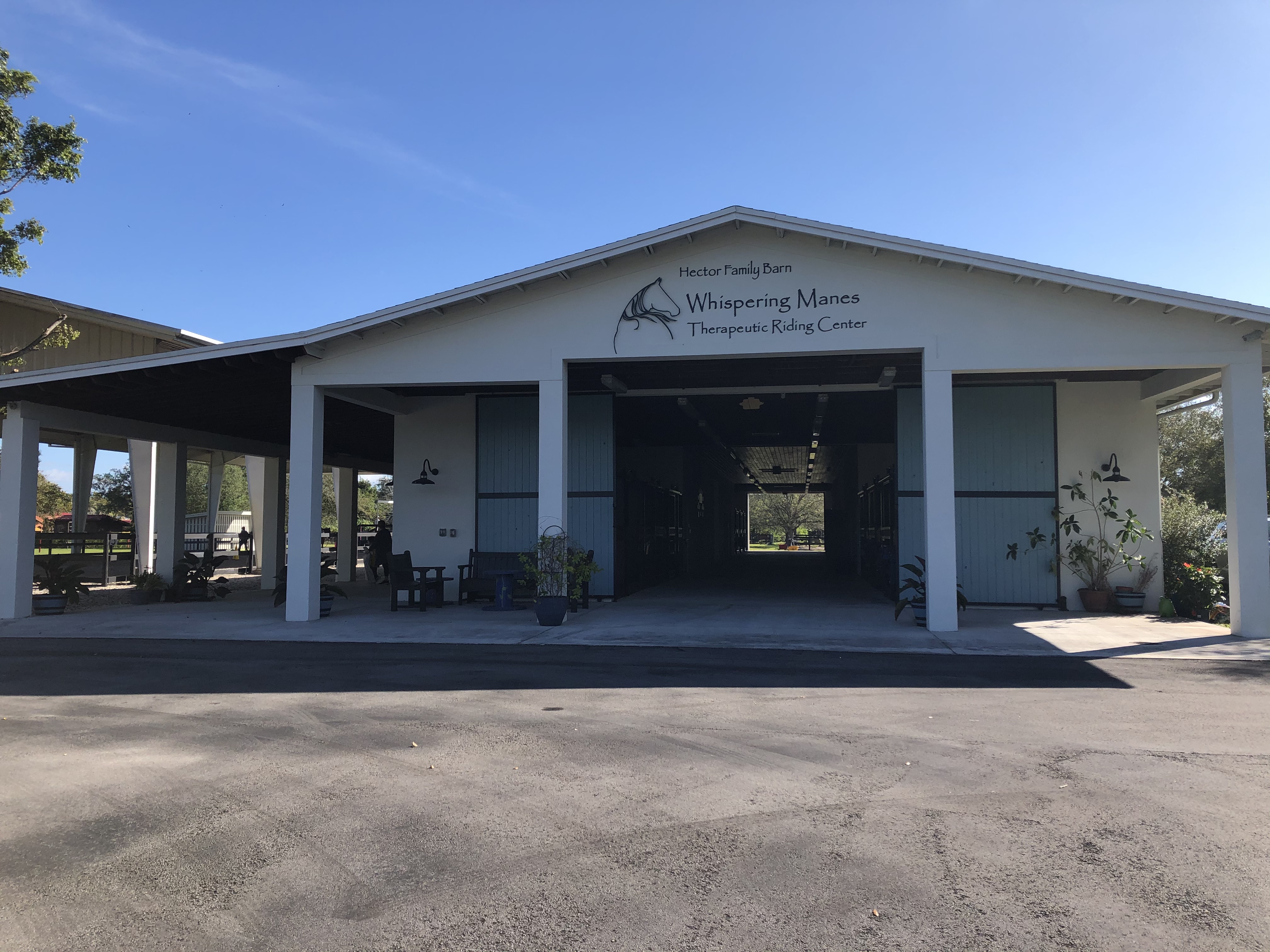
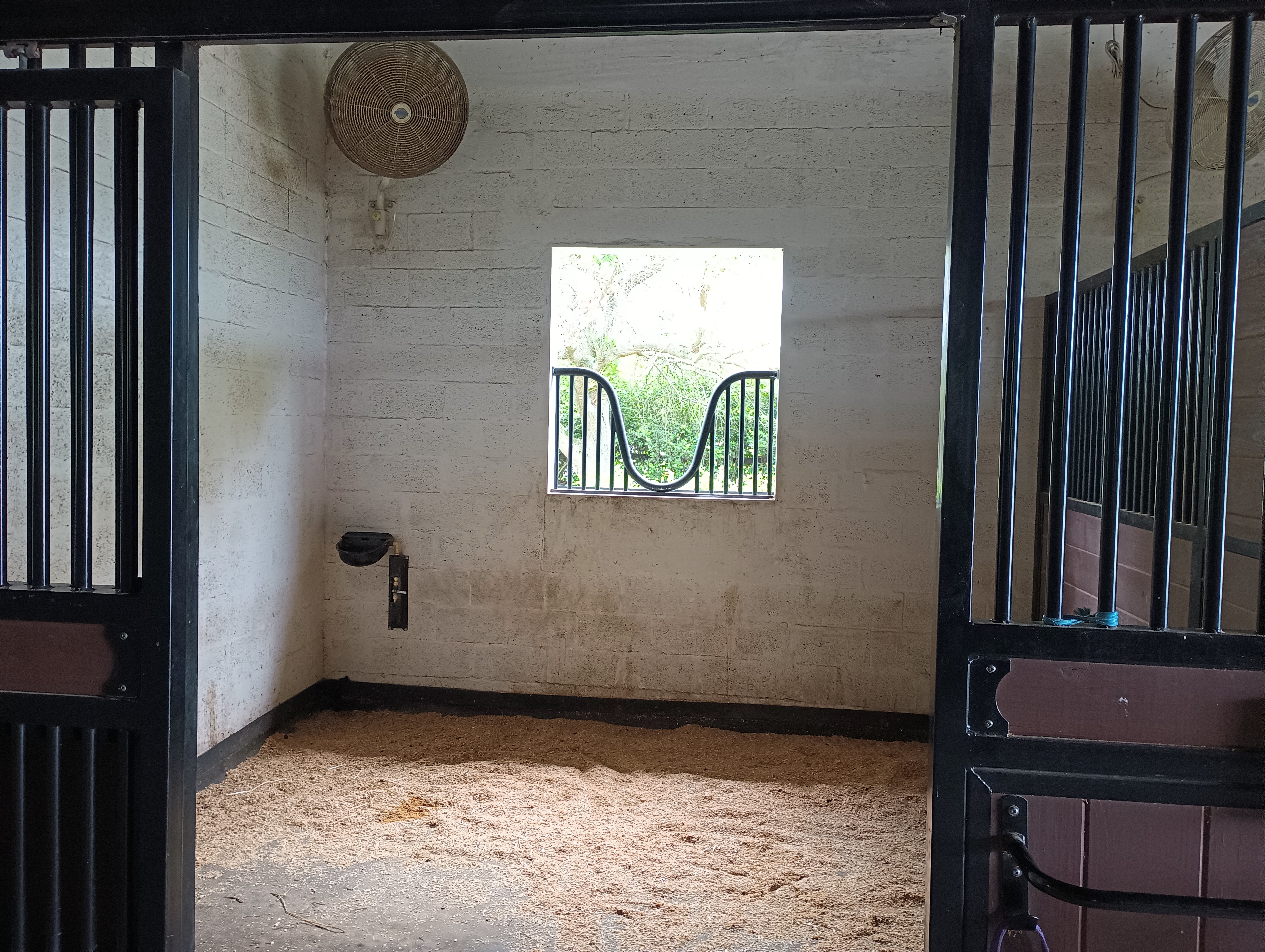
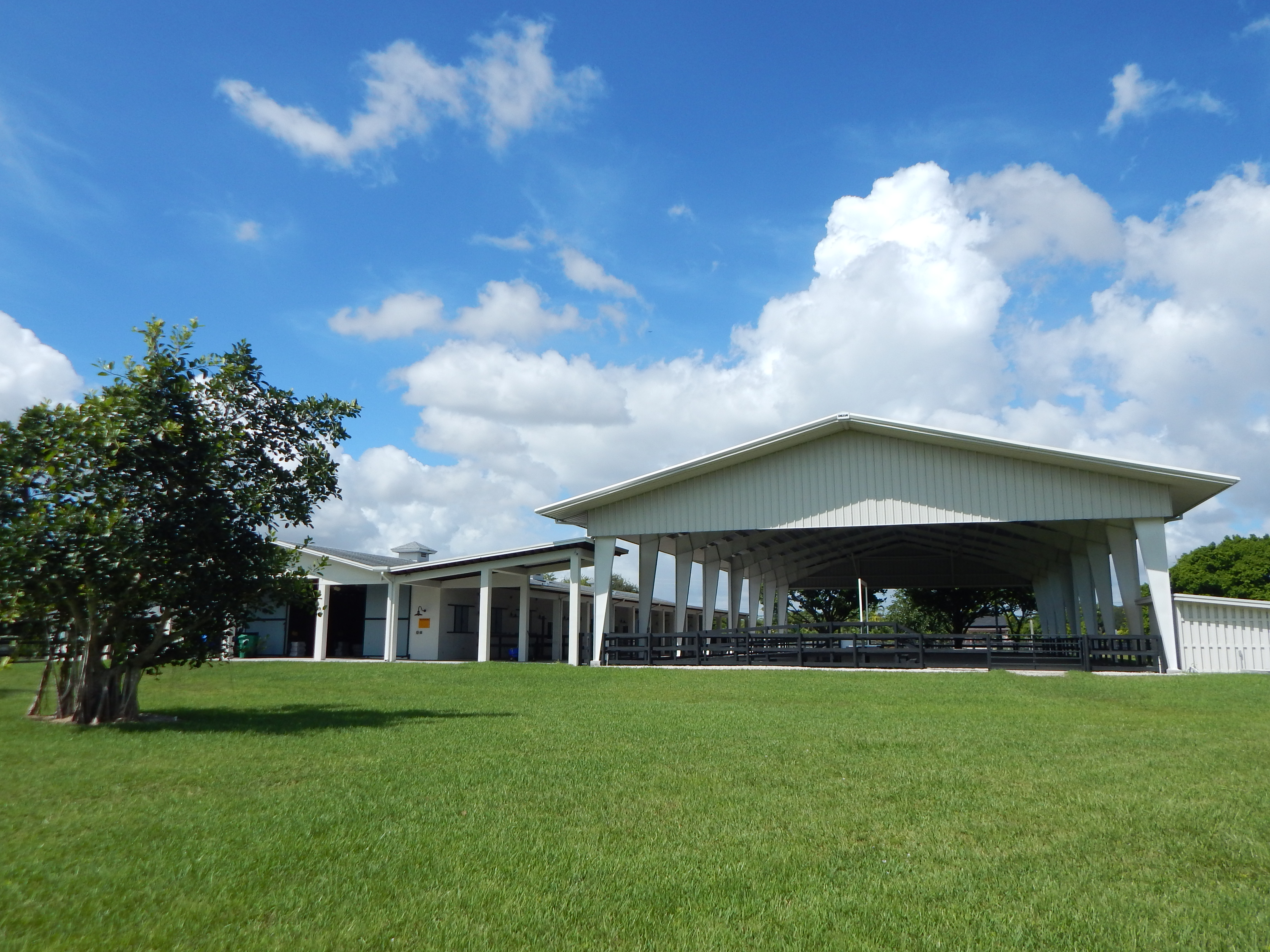
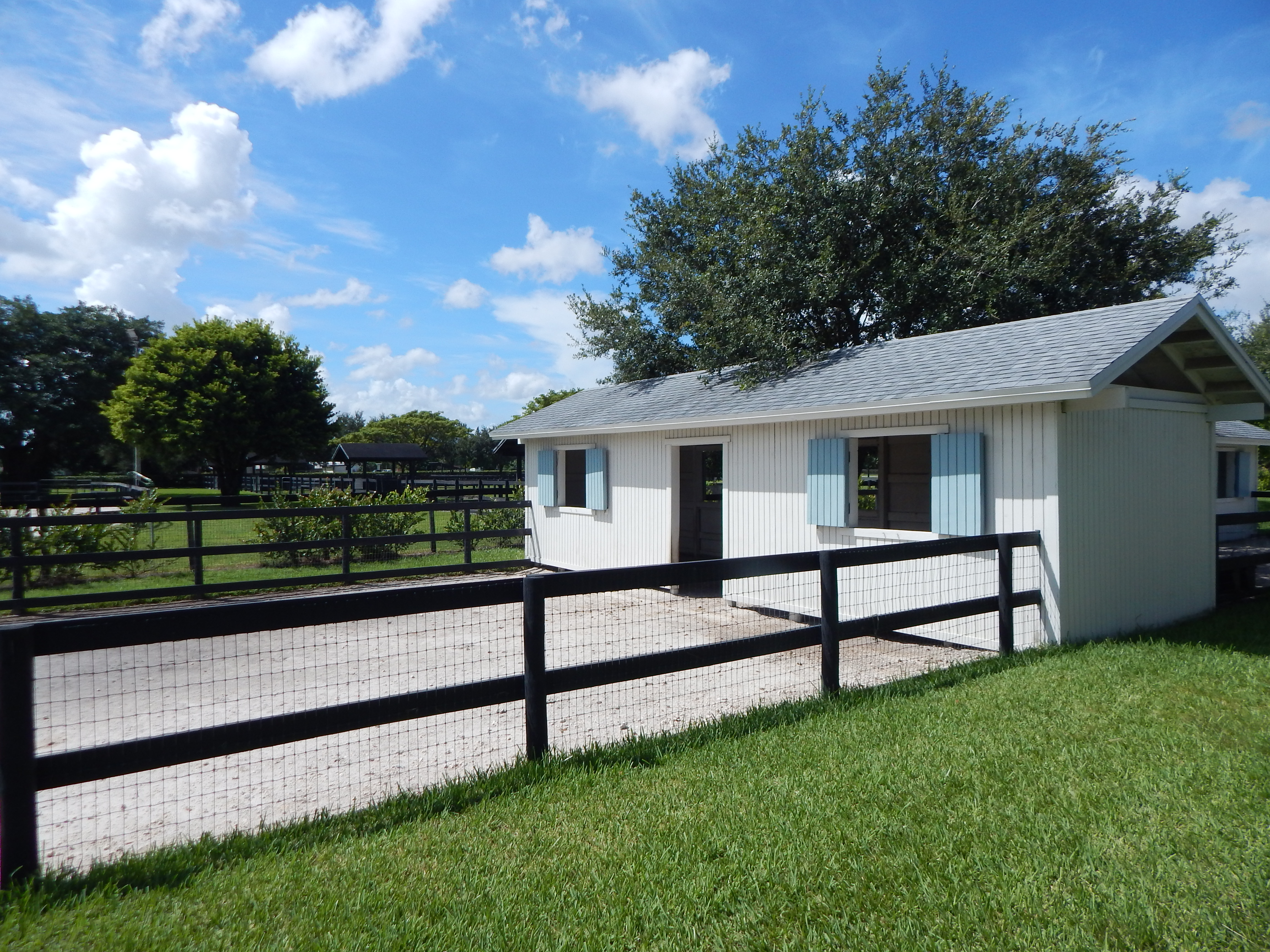

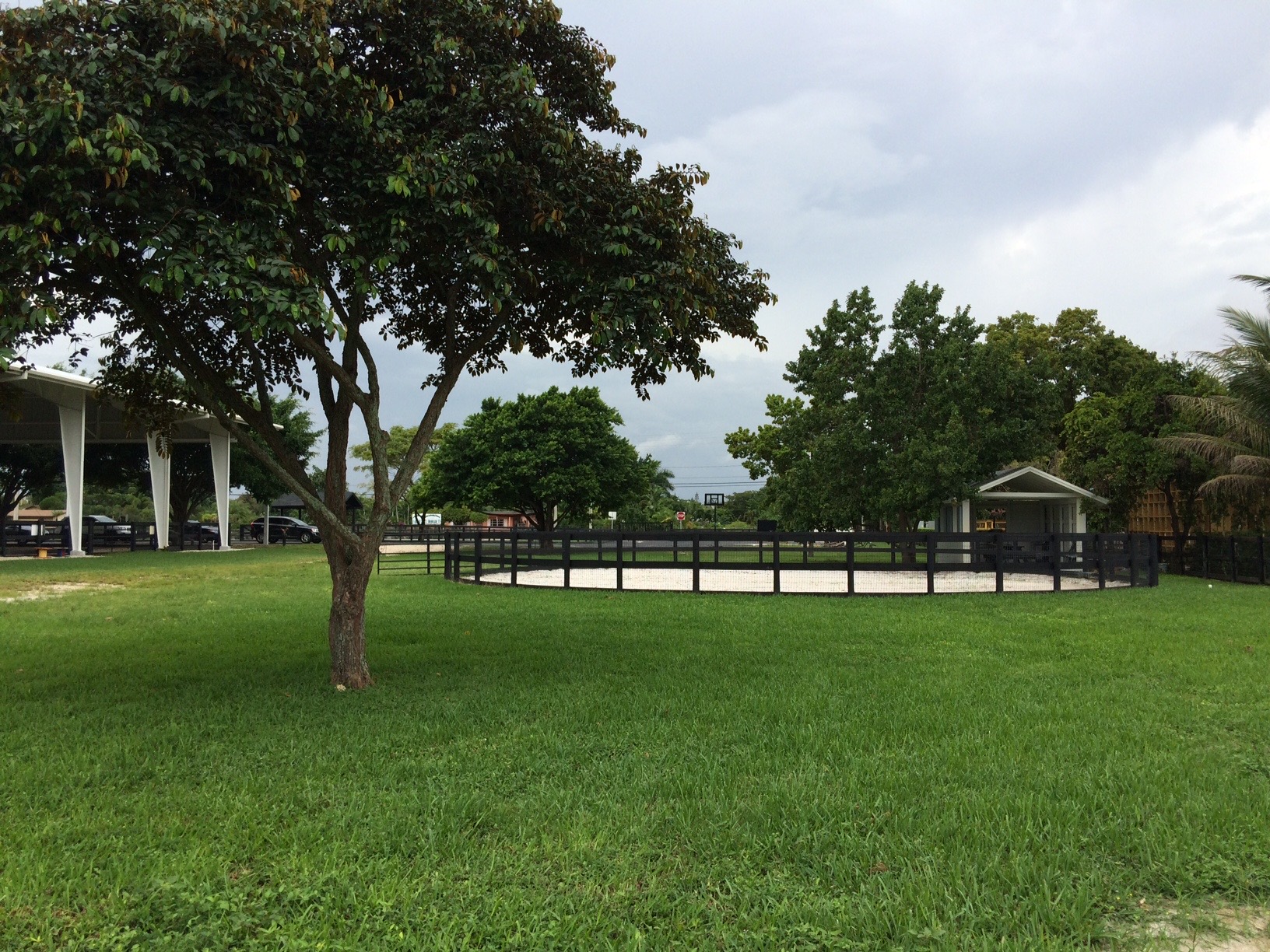
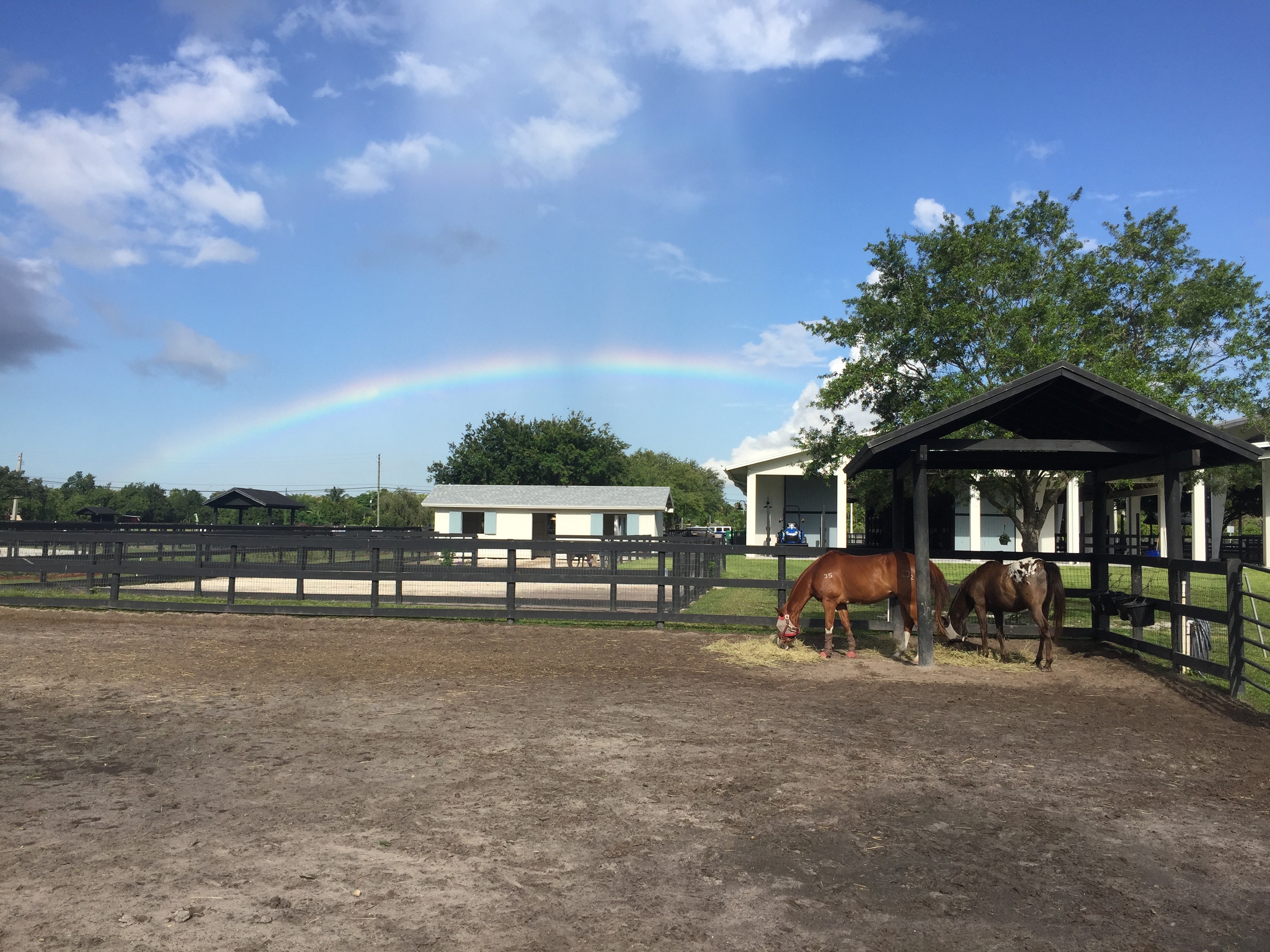
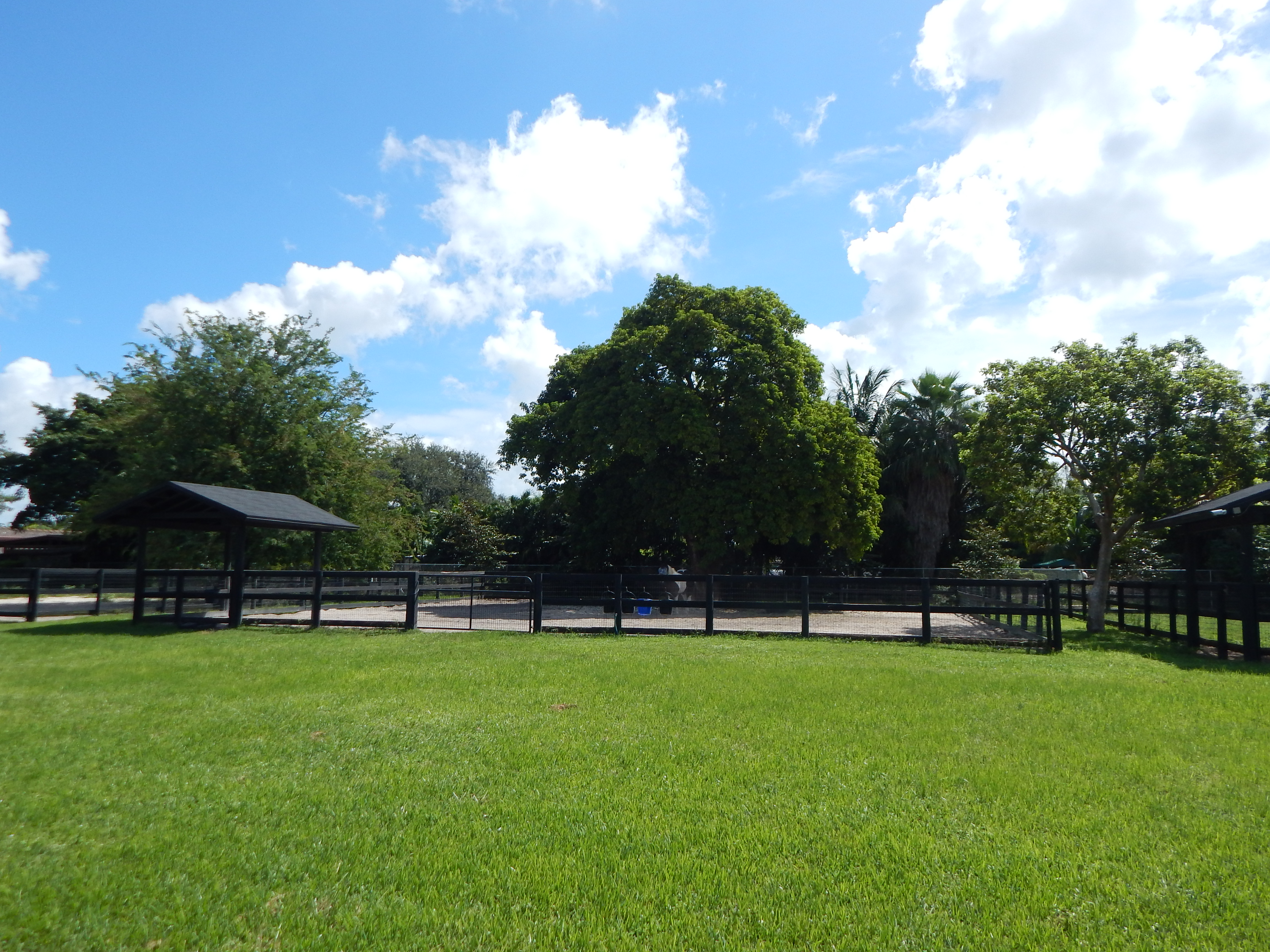

Are the organization's rules, restrictions and warnings (signage) conspicuously posted in easily accessible locations? Yes
Are the organization's emergency contacts, including veterinarian contact information, conspicuously posted in easily accessible locations? Yes
Are human and equine first aid kits easily accessible? Yes
Regarding all shelters where horses are housed including run-in sheds:
Do horses have assigned stalls in the barn/structure(s) or exclusively assigned shelter locations where they are separated from other horses with a barrier? Yes
How many hours per day, on average, are horses stalled or restricted to these sheltered exclusive shelter locations? 0-3;
How often are the stalls/shelters cleaned, i.e., kept in good repair and free of standing water, accumulated waste, sharp objects and debris? 6-7 Days a Week
Do all stalls/shelters allow horses to lie down, stand up and turn around and provide protection from inclement weather (wind, sleet, rain, snow and extreme temperatures)? Yes
Are stalls/shelters kept in good repair, with adequate ceiling height, and free of standing water, accumulated waste, sharp objects and debris? Yes
Are floors constructed and maintained for both good drainage and traction? Yes
Is there a ventilation and circulation system in place to allow free flow of air to control temperature, and humidity, and to prevent air stagnation? Yes
Is wiring inaccessible to horses and maintained for safety in all areas of facility? Yes
Are fire prevention/protection measures (fire alarms, extinguishers and sprinkler systems) maintained and in good working order? Yes
Is there adequate lighting to ensure safety in all areas of facility? Yes
How many hours per day, on average, are horses turned out:
Equines are out 24/7 except they are brought in if there is inclement weather
The following describes the pastures at this facility:
All pastures are fenced to prevent escape or injury
Fencing checks, such as broken or missing planks, loose fence posts, exposed or loose nails, detached wires, etc., are done regularly
Pastures have natural protection for equines (i.e., trees)
Pastures have man-made protection for equines (i.e., shelters)
This facility does not have pastures where equines can graze on pasture grass
This facility has a written plan in place for pasture management, which includes guidelines for seeding, fertilizing, irrigation, mowing, dragging, harrowing, manure removal, removal of debris, the control of poisonous plants, and a schedule for cleaning
A dedicated staff person(s) is responsible for pasture management
Barbed wire is used for fencing
Electric fencing is used; electric wires or tape fence are visibly marked
Pastures are rotated
The following describes the turnout areas other than pastures at this facility:
A dedicated staff person(s) is responsible for the maintenance of turnout areas
All turnout areas are fenced to prevent escape or injury
Turnout areas have man-made protection for equines (i.e., shelters)
Fencing checks, such as broken or missing planks, loose fence posts, exposed or loose nails, detached wires, etc., are done regularly
This facility does not have turnout areas
This facility has a written plan in place for the maintenance of turnout areas, which includes a schedule for cleaning, manure removal, and dragging
Barbed wire is used for fencing
Electric fencing is used; electric wires or tape fence are visibly marked
The following policies and procedures are in place at the facility to restrict public access and to keep horses safe:
There is a mechanism in place to monitor equines overnight
Hold Harmless signs are posted
Entrance gates are locked at night
Visitors are only permitted at specific times
Visitors are only permitted in specific areas
The property is fitted with a security system that is monitored internally by staff (or the property owner)
The perimeter of the property is fully fenced
The property owner, staff member or caretaker lives on the premises and ensures that public access is restricted and is responsible for the security of the facility and equines
A security guard is present at night
By Appointment Only signs are posted.
No Trespassing signs are posted
Authorized Personnel Only signs are posted
The property is fitted with motion lights
The property is fitted with a security system monitored by police or a professional service
Equine Care/Emergency Preparedness: Whispering Manes Therapeutic Riding Center (*Main) 2026 and 2025 This section is required.
Horse Health Care/Barn Management Records: What system is used to collect and store health/horse care records?
Notebook or equivalent (technology not utilized)
Onsite computer with cloud-based backup storage system
Our organization would use free cloud-based barn management software if available
The following items are consistent with our feed management plan and practices:
Equines are provided with individualized feeding plans, including supplements, according to the equine's age, breed/type, condition, size, work level and any health issues, consisting of nutritious food provided in sufficient quantity and access to adequate natural forage, or be fed daily, or as recommended by the organization's veterinarian
Feed plans are determined in consultation with a veterinarian
Supplement plans are determined in consultation with a veterinarian
Equines are fed grain in individual stalls
Equines are fed grain in groups
Staff and/or volunteers are trained in proper feed measurements and protocols and observed periodically to ensure they are feeding correctly
The feed chart is centrally located and updated as needed
The area(s) where hay, feed, grain, and supplements are stored are kept clean, free of debris and chemicals, and protected from weather and other animals in rodent-proof and mold-proof containers and grain bins
Feed, supplements and hay types are clearly labeled
Water sources, i.e., buckets, troughs, automatic waterers, etc. are kept clean, free of contaminants, debris and chemicals, protected from weather and other animals, and be positioned or affixed to minimize spillage.
Medications are kept in a secure area
Is clean, potable water available at all times for all equines? Yes
Hoof Care: How often is hoof care provided for each equine? Every 4-8 weeks and when an issue arises
Dental Care: How often is dental care provided for each equine? Annually and when an issue arises
Horse checks: How often are equines visually and physically checked by personnel at the facility? Every day or 6 days a week
Our organization has the following parasite and fly/insect control protocols in place, including remedies used to control flies and insects:
Our organization follows the parasite control guidelines of our veterinarian, including fecal testing and de-worming
Fly/Insect Control Remedies:
Fly parasites
Fly Traps and Tapes
Fly Spray Repellent
Fly Masks
Fans
The following represent the biosecurity practices in place at facility:
Our organization follows the biosecurity guidelines of our veterinarian
Sick, affected and/or quarantined equines do not have contact with other equines or other animals
Staff are trained in best practices related to biosecurity
A specific individual is trained and assigned to care for sick, affected and/or quarantined equines
Sick, affected and/or quarantined equines are cared for last if the caretaker must also care for healthy equines
Restricted access signs are posted at primary points of access to sick, affected and/or quarantined equines
Hand sanitizers are available at all primary points of access to sick, affected and/or quarantined equines
Footbaths are available at all primary points of access to sick, affected and/or quarantined equines
Manure and bedding from sick, affected and/or quarantined equines is removed from the facility - not put in open air piles, and not spread on pastures
Quarantine areas, such as stalls, aisle ways, paddocks, and common areas, are cleaned (and needed, disinfected) after conclusion of the quarantine.
Trailers/vans used by sick, affected and/or quarantined equines are cleaned and disinfected after each use and cleaning takes place away from where equines are sheltered
Equipment used by sick, affected and/or quarantined equines is not shared
Equipment used by sick, affected and/or quarantined equines is cleaned of organic debris and disinfected after each use
Latex gloves, or equivalent gloves, are worn when working with sick, affected and/or quarantined equines
The organization has a written biosecurity plan
Volunteers are trained in best practices related to biosecurity
Equines are not quarantined on arrival.
Additional information on biosecurity:
We do not have a written biosecurity plan. We are a closed property and horses do not come on and off our property. When a new horse arrives, the horse usually arrives from a facility we are familiar with. We are strictly a therapeutic riding center and we do not offer rescue services, so we know the background on any new horse that is added to our herd. Horses are kept separate from the herd when they arrive for a period of 30 days. If we had a sick equine, our biosecurity plan is to follow the advice of the veterinarian regarding disposal of bedding and manure. All manure is removed from our property on a regular basis. Manure is never spread around the property and is maintained in a separate area, that is a distance from the barn to aid in fly control.
The following represent the manure removal practices in place at facility:
Manure is piled in an area where equines are not located
Manure is hauled, sold or given away
Our organization adheres to the manure management guidelines set by the state, local authorities, and/or our organization's veterinarian
Manure is stored in dumpster(s)
Manure piles are covered
Manure piles are composted or spread on pastures
The following steps are taken to help staff and volunteers readily identify each horse on the property:
Equines are assigned the same exclusive stall/shelter location each day
Name plates are located on the stall/shelter location
Equine photos and profiles are available on the website
Staff/volunteers are provided training on conformation, markings, colors, and breeds
Team leaders work with new staff/volunteers until they are able to identify the equines
Photos are located on the stall/shelter location
Equines wear halters with nametags
A notebook or binder with photos and information on each equine is easily accessible
A map/diagram is posted showing the location of each equine with equine names and photos
Staff and volunteers are provided with an information packet with equine profiles, including photos and detailed descriptions
Our organization has the following policies and procedures in place pertaining to tack, apparel and equipment:
Saddles are shared
Saddle pads are shared
Blankets, sheets and turn out apparel are fitted and utilized for each equine appropriate to the equine's needs and the weather conditions
Blankets, sheets and turn out apparel are cleaned regularly as needed
Riding Tack is always cleaned at least weekly
Riding Tack is inspected for overall working condition before each use by trained personnel
Riding Tack is assessed for fit before each use by trained personnel
Riding Tack is assessed for fit by trained personnel when an equine's body condition changes
Riding Tack is assessed for fit by trained personnel when an equine's disposition changes
Assigned riding tack is clearly labeled
Riding Tack is stored in a climate-controlled location
Helmets are shared
Helmets are cleaned/disinfected after each use
Helmets are replaced after a fall
Helmets are replaced at least every five years.
All equines have specifically assigned apparel, equipment and tack (saddles/bridles if ridden) that is not shared
Bridles are shared
Bits are shared
Blankets are shared
Sheets are shared
Turnout apparel is shared
Halters are shared
Riding Tack is always cleaned after each use
Riding Tack is cleaned only when needed
This facility enlists the services of a professional saddle fitter at least once a year
No equines are ridden; saddles, bridles, etc. not applicable.
Emergency Preparedness: Whispering Manes Therapeutic Riding Center: *Main This section is required.
The following plans, policies, and procedures are in place at the facility to handle emergencies and address weather related issues, fire safety procedures, and/or any additional hazardous scenarios the facility could potentially experience:
Emergency procedures are posted prominently
The facility owns or has access to a generator
The facility maintains at least two weeks of hay, feed, shavings and medications
The facility maintains appropriate liability and/or workers' compensation insurance
The organization has a written emergency preparedness/safety plan (EPP)
The facility collects and maintains medical information from staff, volunteers, and clients
Medical emergencies for clients, staff, and volunteers
Medical emergencies for equines
Fire
Natural Disasters - thunderstorm, hurricanes, earthquakes, tornados, etc
Protocols to notify emergency personnel
Building/facility exit plans
Local fire department and/or the state's emergency planning department procedures
Evacuation plans
Power outages
Terrorist attacks
The facility follows the specific procedures to help PREVENT emergency situations:
Smoking is strictly prohibited
NO SMOKING signs are posted prominently
Hay is stored away from permanent or temporary structures where equines are stalled
Permanent or temporary structures where equines are stalled are kept free of dust, cobwebs, trash, cleaning rags, and other flammable items
Aisles and doorways are kept clear
Heaters with automatic shutoff settings are used
How often are the following checked or performed?
Fire Extinguishers are checked: Monthly
Smoke detectors are checked: Not at all/NA
Fence lines are checked: Daily
Turnout Areas are checked: Daily
Sprinkler systems are checked: Not at all/NA
Fire drills are conducted: Not at all/NA
Review of safety protocols with staff are conducted: Annually
Review of safety protocols with volunteers are conducted: Annually
The Emergency Preparedness Plan is reviewed and updated: Annually
Equine Transportation: 2= Onsite: 2 (0 + 2) + Offsite: 0
2-horse van/trailer with truck:
2 Access onsite but not owned
© Copyright 2018 EQUUS Foundation 892 4.00